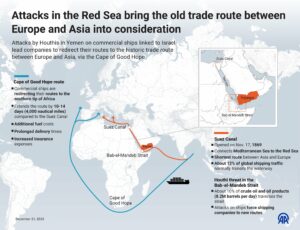Global Trade Slides 1.3% Amid Red Sea Attacks

The recent surge in attacks on merchant vessels in the Red Sea has sent ripples through the global economy, triggering a 1.3% drop in trade volume last month. This seemingly small percentage masks a larger story of disrupted supply chains, rising costs, and potential economic consequences.

Red Sea: A Bottleneck of Global Commerce
The Red Sea, a vital artery for trade between Asia and Europe, has witnessed an alarming rise in attacks by Houthi militants. This has led to a dramatic decline in cargo transit, with container traffic plunging by over 50%. Ships are opting for longer, more expensive detours around the Cape of Good Hope, adding precious days to their journeys.
Europe Feels the Sting First
Europe, heavily reliant on Red Sea shipping, is bearing the brunt of the disruption. The Kiel Trade Indicator paints a sobering picture: EU imports fell by 3.1% in December, and exports dipped by 2%. Germany, a powerhouse exporter, saw both imports and exports decline by 1.8% and 1.9%, respectively.
Beyond Borders: A Domino Effect
While Europe feels the immediate impact, the implications extend far beyond. Delays and rising costs ripple through supply chains, potentially leading to product shortages and price hikes for consumers worldwide. Industries dependent on just-in-time deliveries are particularly vulnerable.
A Precarious Outlook
The immediate future remains uncertain. Continued attacks could further depress trade volumes and exacerbate economic woes. Diplomatic efforts to de-escalate the situation in Yemen are crucial to restoring stability and reopening the Red Sea for uninterrupted trade.
Navigating the Storm: Finding Solutions
In the meantime, stakeholders are scrambling to adapt. Shipping companies are exploring alternative routes, implementing stricter security measures, and urging diplomatic intervention. Diversification of trade routes and increased reliance on land transport are also being explored.
A Call for Collective Action
The Red Sea crisis underscores the interconnectedness of the global economy. It highlights the fragility of vital trade arteries and the need for robust international cooperation to safeguard them. Addressing the root causes of the conflict in Yemen, fostering dialogue, and ensuring the safety of maritime routes are not merely economic necessities, but also pressing humanitarian concerns.
This trade dip is a stark reminder that global commerce is not immune to geopolitical turmoil. As we navigate these choppy waters, it’s crucial to remember that collaborative efforts and unwavering commitment to peace are essential to ensure smooth sailing for the world economy.







